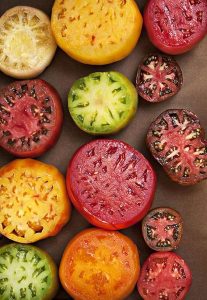People around the world are getting more thoughtful about their food and are seeking quality, sustainability and big flavor on the plate.
Largely driven by chefs, microbakers, microbrewers and small-operation farmers, the growing trend for reviving our culinary history includes dogged pursuit and then loving cultivation of near-extinct heirloom crops and livestock. Dedicated artisans are bringing back some foods from the brink of extinction.
One look at the cover of Charleston chef Sean Brock’s new cookbook Heritage (2014 Artisan) tells the story. The image is of Brock’s outstretched arms (left arm tattooed in a vibrant mosaic sleeve of passion flower, beet, viola, scallions, radishes and carrots), his cupped hands holding many varieties of red, white, brown and black speckled dried beans. It’s as beautiful and simple as Brock’s passion for food and ingredients.
As a young chef enamored of Southern food culture, Brock was disappointed by the blandness of the signature Lowcountry dish, Hoppin’ John, whose primary ingredients are rice and peas. When he was finally served a version made with heritage breeds of the ingredients, a light bulb went on. He realized that the last century’s industrialization bred much of the original flavor out of the humble ingredients that made our grandmothers’ food amazing. This defining moment changed his outlook on food and set him on an obsessive quest to revive the true foods of the South. He sources and experiments with ingredients raised by fruit and vegetable farmers as well as livestock breeders who are as intent as he is on bringing back heirloom stocks. The book’s recipes and photos will make you drool, teach you new respect for seeds and grains, and drive home the importance of going to the source to improve your food.
In a similar vein, the ovens of artisanal bakers are stoked with what could be hope for those who have sworn off gluten. What if people with gluten sensitivity could alleviate symptoms with breads that are baked with true slow food methodology and ingredients? Washington State University crop scientist Stephen Jones, PhD, thinks that perhaps old-fashioned bread-making techniques, including a longer rising method that allows for natural fermentation and boosts digestibility, could be key. Jones—an adviser at WSU’s The Bread Lab, the first public laboratory designed solely for the testing and development of products and techniques for the craft baker—is encouraging people to try heirloom wheat and artisanal bread made with fresh, whole-grain flour. It is both delicious and important for minerals, fiber and other nutrients.
Finally, seed-saver exchanges for everything from hops and vegetables bred for better flavors are springing up in communities and in Web forums all over the world.